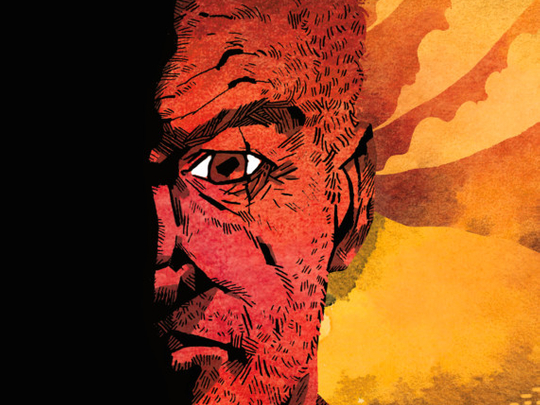
Sand by Wolfgang Herrndorf, translated by Tim Mohr
Pushkin, 480 pages,$18
Sometimes you come across a novel so dazzling and original you cannot wait to see what its author will write next. Tragically, in the case of Wolfgang Herrndorf’s Sand, there will be no more: in 2010, the same year he burst upon the German literary scene, Herrndorf was diagnosed with a terminal brain tumour. Three years later he shot himself before the tumour could kill him. Sand, which won the Leipzig Book Fair prize in 2012 but has only now been translated into English, is the last book he wrote. Fittingly, it is a masterpiece: at once a thriller, a surrealist comedy, and a dark satire, culminating in one of the greatest twists I’ve read.
Set in 1972 in an unnamed North African country that is a thinly veiled version of Morocco, Sand opens with a police investigation into the brutal murder of four Westerners at a desert commune. But it soon becomes clear this isn’t the real focus of the story. That belongs to Carl - except Carl isn’t his real name - a man who wakes up in the desert with a nasty blow to the head and no memory of who he is or how he got there. Pursued by murderous thugs who believe he has something that belongs to them, he finds himself caught up in a dangerous plot - only he has no idea what they are after or what his part in it all is.
With the unlikely help of an earnest young American saleswoman, he sets out to find out who he is before his enemies can track him down. Herrndorf laid to rest the old canard that Germans have no sense of humour in his breakthrough novel, Tschick (2010), which sold over a million copies in Germany and was published in English as Why We Took the Car (2014). There is plenty from the same vein of anarchic comedy in Sand, in which we encounter a terrorist arms dealer named Khach-Khach, a gangster known as the King of Crooks, a Swedish spy with sunstroke, a lone madman mining for gold in the mountains and a dubious American psychiatrist who makes a living out of treating damaged Western tourists. But Herrndorf was dying as he wrote Sand, and it shows in more than the mysterious headaches that plague one of the minor characters.Why We Took the Car was written for young adults; Sand, with its brutality and bleakness, is most definitely for grown-ups, and the humour is as black as it gets. “Use your last conversation to make a statement that isn’t completely meaningless,” one of Carl’s pursuers tells him. “You make me want to throw up,” he replies. And for all the jokes, a dark thread of seriousness runs through the book. “I’m afraid we’re the good guys here,” a CIA torturer tells Carl. “Nothing is more important than a human life. Even when it is the life of a liar. Every life is priceless, unique and worth preserving. Says the lawyer. The problem is, we’re not lawyers.”
The book’s English publishers describe it as “part Le Carre, part Coen brothers”. I’d say it’s rather more the latter than the former. There’s also a distinct flavour of Thomas Pynchon at times: Carl runs into an LSD-fuelled rock band who perform in US military uniform and call themselves Marshal Mellow, and it’s not long before the paranoid realisation dawns: “You guys are really military, aren’t you?” But at the end of the novel, Herrndorf does something quite different with Sand.
Just as you are beginning to fear the mystery will be left unexplained and ambiguous, he resolves it. All the loose ends are tied up, and we find out who the mysterious protagonist is, in a reveal so dark and brilliant I doubt anyone will see it coming.
The twist is one of literature’s more overused techniques. But in his last work Herrndorf found a way to revitalise it: where thriller writers usually sacrifice realism for the sake of the twist, in Sand it works the other way around. Reality crashes down on a novel that had felt like a flight of fancy. It is a fitting final work for a man who declared, on being given a year and a half to live: “I’ll write a book. If I get a month, I’ll write a chapter every day. If I get three months, I’ll do it properly. A year is pure luxury.”
Justin Huggler’s new novel, The Return Home, has been recently published by Short Books.
– The Telegraph Group Limited, London, 2017









